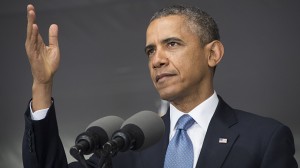Special to WorldTribune.com
WASHINGTON — President Obama in a major speech at West Point announced the United States plans to spend billions of dollars for a counter-insurgency effort in North Africa.
The administration of President Barack Obama has approved a CI strategy meant to stabilize such regions as North Africa and Sahel. Under the Counterterrorism Partnerships Fund, the administration would allocate $5 billion to fight Al Qaida.

“Today, as part of this effort, I am calling on Congress to support a new Counterterrorism Partnerships Fund of up to $5 billion, which will allow us to train, build capacity, and facilitate partner countries on the front lines,” Obama said.
In an address to West Point on May 28, Obama said the U.S. withdrawal
from Afghanistan would free up troops for a training and advisory mission
for Africa. The president cited U.S. operations in such countries as Libya,
Mali and Somalia.
“And these resources will give us flexibility to fulfill different
missions, including training security forces in Yemen who have gone on the
offensive against Al Qaida; supporting a multinational force to keep the
peace in Somalia; working with European allies to train a functioning
security force and border patrol in Libya; and facilitating French
operations in Mali,” Obama said.
Obama said the CI plan was drafted by the National Security Council in
early 2014. He said the strategy would address Al Qaida threats in U.S.
allies in the Middle East.
“But as we move to a train-and-advise mission in Afghanistan, our
reduced presence allows us to more effectively address emerging threats in
the Middle East and North Africa,” Obama said. “So, earlier this year, I
asked my national security team to develop a plan for a network of
partnerships from South Asia to the Sahel.”
The president said the most direct threat to the United States was what
he termed terrorism. But Obama said Washington would not send troops to
battle Al Qaida abroad.
“I believe we must shift our counterterrorism strategy — drawing on the
successes and shortcomings of our experience in Iraq and Afghanistan — to
more effectively partner with countries where terrorist networks seek a
foothold,” Obama said.
Officials said the new strategy was based on the assessment that the Al
Qaida leadership in Afghanistan and Pakistan was no longer in direct control
over networks in the Levant and North Africa. They said this has
reduced the prospect of another Al Qaida strike on the United States as that
which took place in 2001.
“So we have to develop a strategy that matches this diffuse threat —
one that expands our reach without sending forces that stretch our military
too thin, or stir up local resentments,” Obama said. “We need partners to
fight terrorists alongside us.”
Obama said the United States, despite the offensive by the regime of
President Bashar Assad, would not intervene militarily in Syria. Instead,
Washington would increase support for Syria’s neighbors — Iraq, Jordan,
Lebanon and Turkey.
“I will work with Congress to ramp up support for those in the Syrian
opposition who offer the best alternative to terrorists and brutal
dictators,” Obama said. “And we will continue to coordinate with our friends
and allies in Europe and the Arab world to push for a political resolution
of this crisis, and to make sure that those countries and not just the
United States are contributing their fair share to support the Syrian
people.”

You must be logged in to post a comment Login